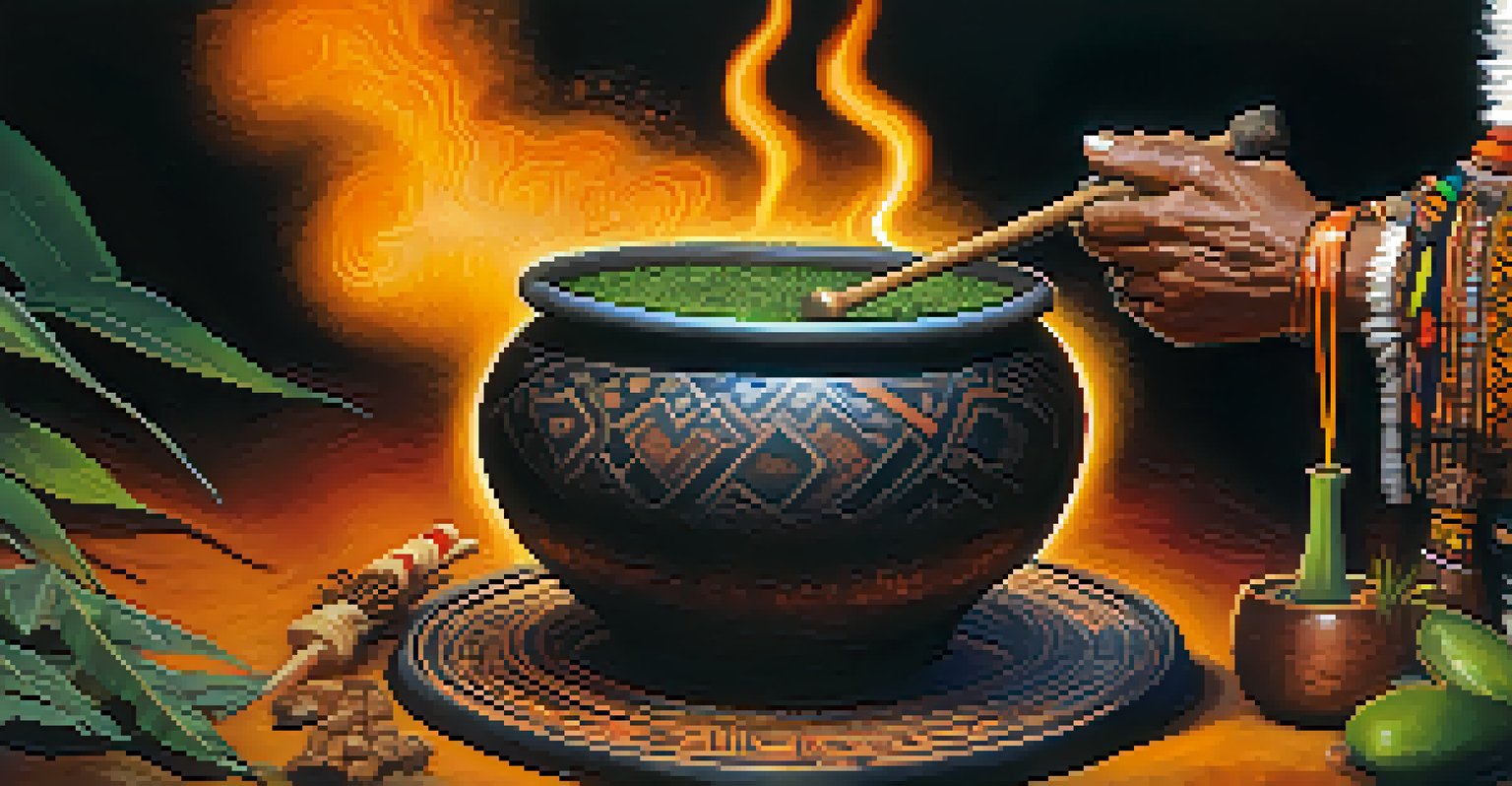Exploring Ayahuasca Rituals: History and Cultural Significance

Understanding Ayahuasca: The Sacred Brew
Ayahuasca is a traditional Amazonian brew made from the Banisteriopsis caapi vine and the Psychotria viridis leaf. This combination produces a powerful psychedelic experience, often used in spiritual ceremonies. For many indigenous cultures in South America, it serves as a bridge between the physical and spiritual worlds, facilitating deep introspection and healing.
Ayahuasca is a tool for self-discovery and healing, connecting us to our inner selves and the world around us.
The brew has a long history, with evidence of its use dating back thousands of years among various tribes. It is not simply a recreational substance; rather, it's revered as a sacred tool for connection to the divine. This historical significance is crucial to understanding Ayahuasca's role in cultural rituals today.
As interest in Ayahuasca spreads beyond its traditional boundaries, it is essential to respect and honor its origins. Understanding the ingredients and their effects helps to appreciate the depth of this ancient practice. It is this blend of history, culture, and spirituality that makes Ayahuasca so compelling.
The Role of Shamans in Ayahuasca Ceremonies
At the heart of Ayahuasca rituals is the shaman, a spiritual guide who leads participants through their journey. These shamans are often deeply respected figures within their communities, possessing extensive knowledge of the brew and its effects. Their role is not just to administer the Ayahuasca, but to ensure a safe and meaningful experience for all involved.

During the ceremony, shamans often incorporate chanting, music, and other rituals that enhance the journey. This combination of auditory and sensory elements helps participants navigate their experiences and connect with the spiritual world. It's a sacred dance between the shaman, the brew, and the participants that shapes the entire ritual.
Ayahuasca's Cultural Roots
Ayahuasca is a sacred brew with deep historical significance, serving as a bridge between the physical and spiritual worlds for indigenous cultures.
By guiding individuals through their inner landscapes, shamans play a crucial role in the healing process. Their wisdom and intuition help participants confront personal challenges and achieve insights that can lead to profound transformation. This relationship between shaman and participant underscores the communal aspect of Ayahuasca ceremonies.
Cultural Significance of Ayahuasca in Indigenous Communities
For indigenous communities, Ayahuasca is not merely a tool for personal healing; it is a vital part of their cultural identity. Rituals involving Ayahuasca often reflect the community's values, beliefs, and connection to nature. The ceremonies serve as a reminder of their ancestral heritage and the wisdom passed down through generations.
The medicine is not in the brew, but in the experience and the connection we share as we embark on this journey together.
These rituals often emphasize community bonding and collective healing, fostering a sense of unity among participants. The act of sharing an Ayahuasca experience can strengthen social ties and reinforce cultural narratives. It’s a powerful reminder that healing is not just an individual journey but a communal one.
As globalization continues to influence indigenous cultures, the role of Ayahuasca in these communities faces both challenges and opportunities. While some embrace the interest from outsiders, others worry about cultural appropriation and commercialization. Balancing tradition with modern influences is crucial for preserving the integrity of these sacred rituals.
Modern Interest in Ayahuasca: Spiritual and Therapeutic Uses
In recent years, there has been a surge of interest in Ayahuasca beyond indigenous communities, particularly in the realms of spirituality and mental health. Many people seek out Ayahuasca ceremonies to address issues like depression, anxiety, and trauma. The brew is seen as a potential alternative treatment, prompting scientific research into its therapeutic benefits.
Participants often report profound insights and emotional breakthroughs during Ayahuasca ceremonies. These experiences can facilitate healing and a greater understanding of oneself, leading to lasting change. However, it’s essential to approach these ceremonies with respect and caution, as experiences can vary widely from person to person.
Role of Shamans in Ceremonies
Shamans guide participants through Ayahuasca experiences, ensuring safety and facilitating profound personal insights during the rituals.
This modern interest raises important questions about ethics and authenticity in Ayahuasca tourism. As more people seek out these experiences, the challenge lies in ensuring that ceremonies are conducted respectfully and in alignment with traditional practices. Balancing modern curiosity with cultural respect is vital for the future of Ayahuasca rituals.
Navigating the Ayahuasca Experience: What to Expect
If you're considering participating in an Ayahuasca ceremony, it's essential to understand what to expect. The experience can be intense and transformative, often involving vivid visions and deep emotional releases. Preparation is key; many participants engage in a dieta, a special diet, to ensure their bodies are ready for the brew.
During the ceremony, you may encounter a range of emotions, from euphoria to sadness. Each person's journey is unique, and it's important to approach the experience with an open mind and heart. Remember, the goal is often to gain insights rather than to seek entertainment.
Post-ceremony integration is also a crucial aspect of the Ayahuasca journey. Many find it helpful to reflect on their experiences, perhaps journaling or discussing them with others. This integration process can help solidify the insights gained during the ceremony, fostering long-term personal growth.
Safety Considerations and Risks of Ayahuasca Use
While many people find Ayahuasca beneficial, it's essential to recognize potential risks. The brew can interact with certain medications, especially antidepressants, leading to dangerous side effects. Therefore, it's crucial to consult with a healthcare professional before participating in any Ayahuasca ceremony.
Additionally, the setting in which Ayahuasca is consumed plays a vital role in the overall experience. Ceremonies should ideally be led by experienced shamans in safe, supportive environments. This ensures that participants feel secure and can fully engage with the process without unnecessary anxiety.
Modern Interest and Ethical Concerns
The rising popularity of Ayahuasca for spiritual and therapeutic uses raises important questions about cultural respect and the authenticity of ceremonies.
It's also important to be aware of the psychological risks involved. Not everyone may be prepared for the emotional intensity of the experience, and some may encounter challenging thoughts or feelings. Having support systems in place, both during and after the ceremony, can help mitigate these risks.
The Future of Ayahuasca: Cultural Preservation and Adaptation
As interest in Ayahuasca continues to grow, the future of these rituals hinges on cultural preservation and adaptation. Indigenous communities face the challenge of maintaining their traditions while navigating the influx of outsiders. It's a delicate balance between sharing their culture and protecting its integrity.
One positive aspect of this interest is the opportunity for cultural exchange and education. Outsiders can learn from indigenous practices, fostering greater appreciation for the rich traditions surrounding Ayahuasca. This exchange can lead to deeper understanding and respect, bridging gaps between cultures.

Ultimately, the future of Ayahuasca lies in mutual respect and collaboration. By honoring the origins of these rituals and ensuring that indigenous voices are heard, everyone can benefit from the profound insights that Ayahuasca has to offer. The path forward is one of shared knowledge, respect, and a commitment to preserving the sacredness of this ancient practice.